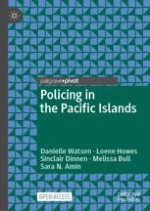This open access book brings together insights into Pacific policing, conceptualising policing broadly as order maintenance involving the actions of multiple local, regional and international actors with sometimes competing and conflicting agendas. A complex and multifaceted endeavour, scholarship on this topic is relatively scarce and widely dispersed across diverse sources. It examines how Pacific policing is shaped by changing state-society relations in different national contexts and ongoing processes of globalisation. Particular attention is given to the plural character of Pacific policing, profound challenges of gender equity, changing dynamics of crime, and the prominence of transnational policing in resource and capacity constrained domestic environments. The authors draw on examples from across the Pacific islands to provide a nuanced and contextualised account of policing in this socially diverse and rapidly transforming region.
